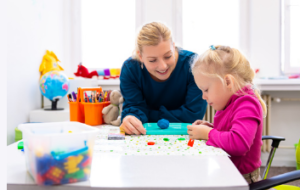Occupational Therapy for Kids
Occupational therapy (OT) helps children acquire the necessary skills for play, learning and growth. It has applications across various issues, from motor skill delays to sensory processing issues.
 Pediatric occupational therapists assist children in improving their daily abilities to perform everyday tasks. While the occupational therapy for kids Adelaide treatments vary, each child will receive a tailored plan based on their needs and circumstances.
Pediatric occupational therapists assist children in improving their daily abilities to perform everyday tasks. While the occupational therapy for kids Adelaide treatments vary, each child will receive a tailored plan based on their needs and circumstances.
Cognitive Behavioural Therapy (CBT)
CBT (Combinatorial Behaviour Therapy) is a form of talk therapy that can assist children and teenagers with anxiety, depression, and other emotional difficulties. It may also be combined with medications to address various mental health disorders in youths.
Treatment with Cognitive Behavioural Therapy (CBT) is typically a short-term process (often 6-20 sessions) that aims to change how people think, feel and act about certain situations in life. For example, CBT helps individuals recognise harmful or inaccurate thoughts or beliefs and then challenges them by replacing them with more valuable alternatives.
Depending on the child’s age and cognitive development, they may be able to participate in this kind of therapy by themselves or with their parents. Some therapists specialise in this work; you can search therapist directories to find one who works with your child.
You and your child’s therapist will begin by discussing your child’s thoughts and feelings. This process, known as ‘case conceptualisation,’ entails making educated guesses about what your child may be experiencing.
You and your therapist will attempt to decipher how these “guesses” are connected. Then, together, they’ll craft a plan for addressing your child’s issues.
It could include asking them to pay attention to their thoughts, feelings and behaviours when facing difficulty or emotional upheaval. You and your therapist can then work together on teaching them how to modify these patterns so they are more helpful instead of harmful.
Occupational therapy for kids Adelaide therapists may ask your child to keep an activity diary, an excellent way to record their daily activities and how they impact their mood. Doing this gives both of you insight into where work should focus and recognise potential areas needing further intervention.
Your child might benefit from Trauma-Focused Cognitive Behavioral Therapy (TF-CBT). Judith Cohen and Esther Deblinger created this type of cognitive behavioural therapy in the late 1980s and early 1990s to assist children and adolescents who have suffered trauma. It teaches relaxation techniques such as deep breathing and muscle relaxation to help manage stress and anxiety symptoms. Treatment usually lasts six to 20 sessions with the child and caregiver present, typically lasting six to 20 sessions.
Child-Parent Relationship Therapy (CPRT)
Child-Parent Relationship Therapy (CPRT), an adaptation of a play therapy model, is an evidence-based treatment for children who experience behavioural or emotional problems. CPRT helps kids build healthy relationships with their parents and has proven successful in treating oppositional defiance disorder, conduct disorders, anxiety disorders, depression issues and attachment disorders.
At CPRT, children and their parents participate in weekly play sessions where they develop skills to foster a secure attachment with their child and empathically respond to underlying needs rather than simply treating symptoms. Furthermore, parents learn to set limits with their kids while showing empathy and respect for their coping abilities and emotional well-being.
CPRT is an evidence-based intervention that has been shown to promote communication between parents and their children, improve family functioning, and reduce attrition during treatment. In addition, it’s a highly motivating and interactive therapy model that empowers parents to act as therapeutic agents in the home.
The therapist guides parents through three group sessions where they gain an understanding of CPRT basics and how to implement skills at home with their children using a kit of toys. At the end of each group session, parents receive feedback from a certified CPRT facilitator on their practice, plus an opportunity to ask any questions if any arise.
Parents looking to develop their parenting skills should consider CPRT, as this therapy has been proven successful in improving parental behaviour, relieving parent stress, encouraging positive child-caregiver interactions and increasing parental enjoyment.





Comments are Disabled